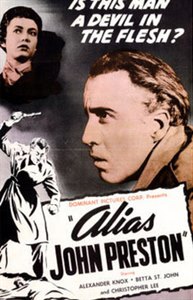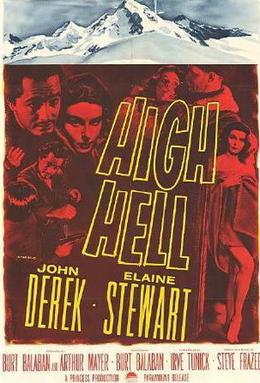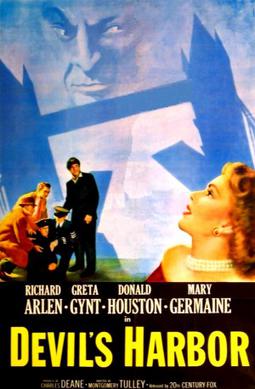Related Research Articles
Reasonable Doubt is a 1936 British comedy film directed by George King starring John Stuart and Nancy Burne. It was produced by the Hungarian Gabriel Pascal.

The Seventh Survivor is a 1942 British spy war film directed by Leslie S. Hiscott and starring Austin Trevor, Linden Travers and John Stuart. It was produced by British National Films and Shaftesbury Films. Shot in 1941, it was released in January the following year. The film was made at the Riverside Studios in Hammersmith as a second feature. It was one of several British films of the time that take place predominantly on lighthouses including Tower of Terror and Sabotage at Sea.
Badger's Green is a 1949 British comedy film directed by John Irwin and starring Barbara Murray, Brian Nissen, Garry Marsh and Kynaston Reeves.
Two for Danger is a 1940 British crime film directed by George King and starring Barry K. Barnes, Greta Gynt and Ian McLean.

Alias John Preston is a 1955 British 'B' thriller film directed by David MacDonald and starring Christopher Lee, Betta St. John and Alexander Knox. A mysterious and wealthy man moves to a small village where he outwardly appears to be a friendly figure but nurses a dangerous secret.
Diplomatic Passport is a 1954 British thriller film directed by Gene Martel and starring Marsha Hunt, Paul Carpenter, Henry Oscar and Honor Blackman. The film stars Hollywood actress Marsha Hunt, who was blacklisted during the McCarthyite era of the early 1950s. Like others in the same position, Hunt was obliged to seek work in the United Kingdom. Produced as a second feature it was made at MGM's Elstree Studios near London.

High Hell is a 1958 American film set in the Canadian Rockies. It was a British B-movie intended for North American audiences, with exteriors filmed in the Swiss Jungfrau and interiors on a British sound stage.

Devil's Point is a 1954 British drama film directed by Montgomery Tully and starring Richard Arlen, Greta Gynt and Donald Houston. The film was produced as a second feature, one of two made by producer Charles Deane starring Hollywood actor Arlen along with Stolen Time. It was released in the United States by 20th Century Fox as Devil's Harbor.
The Phantom Shot is a 1947 British mystery film directed by Mario Zampi and starring John Stuart, Olga Lindo and Howard Marion-Crawford. It marked Zampi's return to filmmaking after he had been interned during the Second World War.
Henry Steps Out is a 1940 British comedy film directed by Widgey R. Newman and starring George Turner, Margaret Yarde and Wally Patch. On the outbreak of the Second World War an idler is forced to join the army by his domineering wife.
Cheer the Brave is a 1951 British comedy film directed by Kenneth Hume and starring Elsie Randolph, Jack McNaughton and Geoffrey Keen. It was made at Southall Studios as a second feature.
Room to Let is a 1950 British historical thriller film directed by Godfrey Grayson and starring Jimmy Hanley, Valentine Dyall and Constance Smith. It was adapted from the BBC radio play by Margery Allingham, broadcast in 1947.
The Temptress is a 1949 British drama film directed by Oswald Mitchell and starring Joan Maude, Arnold Bell and Don Stannard. It was made as a second feature at Bushey Studios. It was the final film directed by Mitchell before his death the same year.
Hot Ice is a 1952 British comedy crime film directed by Kenneth Hume and starring John Justin, Barbara Murray and Ivor Barnard. It was released as a second feature. It is based on the 1934 novel Weekend at Thrackley by Alan Melville and its subsequent play version. An eccentric invites an assortment of guests to his country house, planning to rob them of their valuables.

The Straw Man is a 1953 British crime film directed by Donald Taylor and starring Dermot Walsh, Clifford Evans and Lana Morris. Its storyline focuses on insurance fraud. It is based on the 1951 novel Straw Man by Doris Miles Disney.

The Green Carnation is a 1954 British crime film directed by John Lemont and starring Wayne Morris, Mary Germaine and Marcia Ashton.
The End of the Road is a 1954 British drama film directed by Wolf Rilla and starring Finlay Currie, Duncan Lamont and Naomi Chance. It was produced by Group Three Films as a second feature with funding from the NFFC and distributed by British Lion. It was made at Beaconsfield Studios. The film's sets were designed by the art director Michael Stringer.

The Happiness of Three Women is a 1954 British drama film directed by Maurice Elvey and starring Brenda de Banzie, Donald Houston and Petula Clark. The film was released on the Odeon Circuit as a double bill with The Crowded Day. It was made at Walton Studios with sets designed by the art director John Stoll. It was adapted from Eynon Evans's Welsh-set play Wishing Well.

My Death Is a Mockery is a 1952 British crime film directed by Tony Young and starring Donald Houston, Kathleen Byron and Bill Kerr.

Stolen Time is a 1955 British crime drama film directed by Charles Deane and starring Richard Arlen, Susan Shaw and Vincent Ball. It was released in the United States in 1958 under the alternative title of Blonde Blackmailer.
References
- ↑ Chibnall & MacFarlane p.156